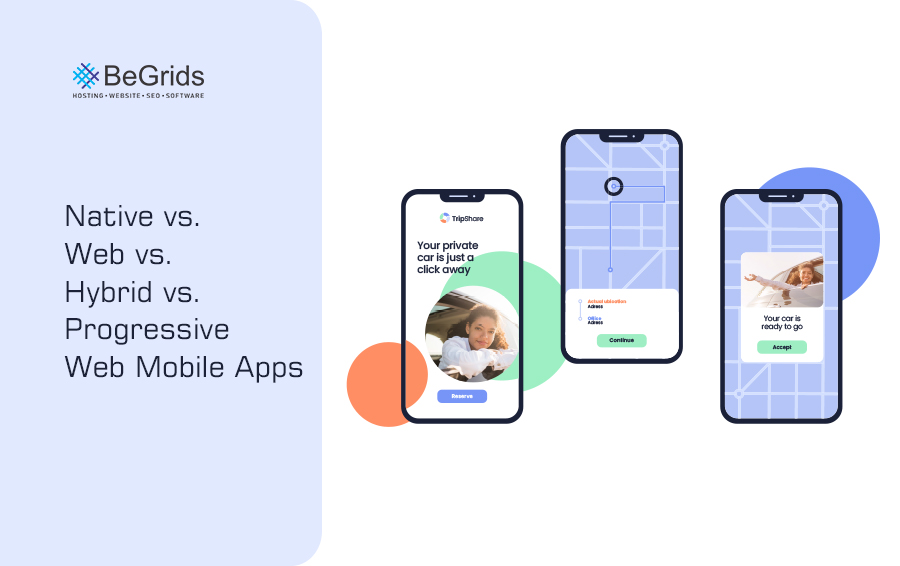Introduction
In a world where mobile apps reign supreme, the battle of the app frameworks rages on! Choosing the right approach for your mobile app can be as tricky as picking the perfect pizza topping—each option comes with its own set of flavors and quirks. Native, Web, Hybrid, and Progressive Web Mobile Apps are the buzzwords swirling around the tech sphere. So, let’s dive deep into the tech tapestry and unravel the mysteries behind these app development approaches!
Native Apps: The Homegrown Heroes
Native apps are the cool cats of the mobile world—they’re born and raised on a specific platform, like iOS or Android. Here’s what makes them the homegrown heroes:
- Speed Freaks: Native apps are optimized for performance because they’re tailored for a particular operating system. This means they can tap into the device’s full potential, delivering lightning-fast experiences.
- Look and Feel: Want an app that seamlessly blends with the user’s device? Native is the way to go! These apps adopt the native design elements, ensuring users feel right at home.
- Access All Areas: Native apps can access all the nitty-gritty features of your device—camera, GPS, contacts, you name it! This access gives developers the power to create feature-rich apps.
The Native Conundrum: Double the Work?
One hiccup with native apps? They play favorites! You need separate codebases for iOS and Android, doubling the workload. It’s like maintaining two gardens when you only wanted one lush oasis.
Web Apps: The Nomads of the Internet
Web apps are the digital nomads, traveling freely across devices through browsers. No installation required—just open your browser and let the surfing begin!
- Universal Access: One codebase, many devices! Web apps are accessible across platforms, making them the go-to choice for reaching a broad audience.
- Budget-Friendly: No need to break the bank. Web apps are cost-effective since you’re working with a single codebase. Less hassle, less cash!
- Instant Updates: Forget waiting for users to download updates. Web apps are always up to date; the changes happen on the server side. Talk about hassle-free maintenance!
Web Woes: Limited Access to Device Features
But, and there’s always a but, web apps have limitations. They can’t tap into the full range of device features like their native counterparts. It’s like having a car but not being able to rev the engine to its full potential.
Hybrid Apps
Hybrid apps are the shape-shifters, combining elements of both native and web apps. They’re built using web technologies but packaged as native apps. Here’s why they’re the chameleons of the app jungle:
- Cross-Platform Glory: Hybrid apps allow you to use a single codebase for multiple platforms. Say goodbye to the hassle of maintaining separate codebases—hybrids unite!
- Device Features, Unleashed: While not as unrestricted as native apps, hybrids still have a good grip on device features. They strike a balance, offering functionality across the board.
- Faster Development: Hybrid development is like the express lane of app creation. Reusable code and quicker testing make the development process smoother and faster.
The Hybrid Headache: Jack of All Trades, Master of None?
However, the hybrid approach can sometimes be a case of ‘jack of all trades, master of none.’ While it’s fantastic for many scenarios, there may be instances where the unique strengths of native or web apps are a better fit.
Progressive Web Apps: The Trailblazers of Tomorrow
Progressive Web Apps (PWAs) are the trailblazers, taking the best of both web and native worlds. They’re web apps with a twist—offering a native-like experience. Let’s explore their charm:
- Offline Prowess: PWAs are like survival experts; they work seamlessly even when the internet connection decides to play hide-and-seek. Users can engage with the app offline, and the changes sync when they reconnect.
- App Store, Who Needs It?: Say goodbye to app store hassles. PWAs don’t need a storefront. Users can add them to their home screen with just a tap, making the experience more straightforward.
- Responsive Goodness: PWAs are designed to adapt to any screen size. Whether on a smartphone or a giant tablet, the user experience remains top-notch.
PWA Predicament: Not a One-Size-Fits-All Solution
Yet, PWAs aren’t a silver bullet for every scenario. Some complex apps might still benefit more from a native approach, especially when intricate device features come into play.
Native vs. Web vs. Hybrid vs. Progressive Web Mobile Apps: FAQs
Q1: Are native apps only for big-budget projects? A1: Not necessarily! While native development can be more resource-intensive, it’s not exclusive to big budgets. Smaller projects might find the benefits outweigh the costs.
Q2: Do web apps work offline? A2: Unfortunately, no. Web apps rely on an internet connection. If you’re looking for offline functionality, consider hybrid or progressive web apps.
Q3: Can hybrid apps access all device features? A3: Almost! Hybrids strike a balance between native and web apps, providing access to a wide range of device features but not all.
Q4: Do PWAs eliminate the need for app stores? A4: Yes and no. PWAs can be installed directly from the web, bypassing app stores. However, for exposure and trust, some developers still opt for app store listings.


